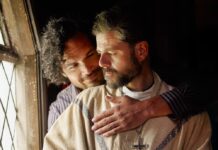Gareth Watkins discovers March dates that made a difference to New Zealand’s LGBTQ+ community.
22 March 1964
Norman “Old Sunshine” Gibson died in New Plymouth. In the 1990s Gibson’s daughter, Miriam Saphira wrote about her father and his relationship with Roy Ayling. Both were soldiers in the First World War, sharing a trench together during the Battle of the Somme in France. Ayling later remarked to the renowned artist Toss Woollaston that “he had seen the younger [Gibson] while at the war, poised for a dive when they were swimming, and loved his beautiful body.” In September 1916, Gibson was shot in the neck and evacuated to a field hospital. Ayling was distraught, a feeling captured in his poem titled Old Sunshine. It reads in part, “Now that we are far apart, / Longing makes the hot tears start, / Who can ease my aching heart? / Old Sunshine.” The love poem stands out proudly in the 1917 wartime publication New Zealand at the Front, written and illustrated in France by members of the New Zealand Division.
March 1972
This year marks the 50th anniversary of the formation of the first Gay Liberation groups throughout Aotearoa. Calls for homosexual law reform had been growing publicly in New Zealand since the mid-1960s. In 1969, following the Stonewall uprising in New York City, a wave of political energy swept around the world, igniting in this country on 15 March 1972. On that day, Auckland University student Ngahuia Te Awekotuku spoke at a university forum after being refused entry into the United States because she was a known lesbian. Te Awekotuku recalled: “It was open-mic day in the university quad and I grabbed the microphone and yelled out what had happened. I said, ‘Let’s start a revolution!’” Within a few months, Gay Liberation groups had been set up in Auckland, Christchurch and Wellington. As highlighted in the November 1972 edition of Gay Lib News, Gay Liberation was far more than just fighting for homosexual law reform – it was about sexual self-determination, “G.L.F. was formed to fight for liberation so that people are not only permitted to explore their sexual identities but are actually expected to.”
11-18 March 1984
The first appearance of The Sisters of Perpetual Indulgence in New Zealand took place during Gay Pride Week in Wellington. The Sisters told Pink Triangle magazine that although they had international links, the local order would be known as the Sisters of Sodomy. Sister Trev told the magazine that dressing as a nun was, “a parody of the Catholic Church which is a major institution of oppression of lesbian and gay men.” Sister Angel Thighs said “What we are talking about is genderfuck. We are getting back to androgyny, the blurring of the margins between masculine and feminine.” The Sisters were originally formed in Iowa, USA in 1979 but soon blossomed into an international order. In 1981, Sydney’s house was established. Its website notes, “Our common aim is to make the world a better place in which to live – one possessed of equality, respect, patience and tolerance. Sometimes desperate times call for desperate measures, and so The Sisters’ actions are quite overt and confronting.”
March 2019
After thirty-five years, one of New Zealand’s longest-running access radio shows – the Lesbian Community Radio Programme – changed its name to QUILTED BANANAS. The acronym stands for Queer, Intersectional, Intersex, Lesbian, Takataapui, Trans, Enby (non-binary), Diverse, Bisexual, Asexual, and “Nanas – because a lot of us also identify as nanas.” Run by a collective, the radio show began in October 1984 and has been broadcast weekly ever since. Broadcaster Linda Evans remembers “[The programme] became extremely important. Isolated lesbian groups and individuals could therefore keep in touch via the programme. One talkback session revealed a lesbian who had ‘listened for years’ before she dared to make contact with others.” The name shift in 2019 was a celebration of people’s diverse identities. The collective’s Facebook page noted that the name was “celebrating all the slippery overlaps these communities can have, and how finding your identity within them can be as messy – but also as fun.”


















